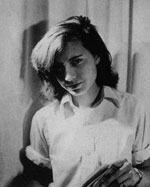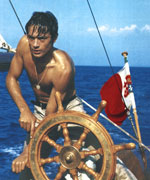
'A Song From Under The Floorboards' is included on Magazine’s 1980 set The Correct Use of Soap, which moved Dave McCullough to write: “I used to want to hit Howard Devoto. Now I want to hug him. He angers me. He keeps me awake. He gets under my skin at times still - and that's good. He's changed - I've changed. He's alive and kicking - so am I.” Elsewhere on the record, on 'Philadelphia', Devoto quips: “I could have been Raskolnikov but Mother Nature ripped me off”. The anti-hero of Dostoevsky’s Crime And Punishment would fascinate Patricia Highsmith’s endlessly, and haunt her writing. The moral ambivalence and complexity of motives and web of repercussions would be central to her stories.
Graham Greene was one of the few other writers Patricia Highsmith genuinely respected. He was a huge fan of her writing, too, over many years, and famously referred to her being the “poet of apprehension”. It’s interesting how the likes of Dostoevsky, Kafka, Camus, and so on, have often been name dropped by pop's highbrow, neither Patricia Highsmith or Graham Greene seem to have been cited in the same way. One exception is Cath Carroll who named her great Factory set England Made Me in tribute to Greene’s haunting entertainment of the same name. The record itself is an overlooked classic mixing electro bossa ballads with shadowy upbeat numbers few would ever dance to. It covers similar ground to Alison Statton recordings of the time (as the ‘80s became the ‘90s), prefacing Saint Etienne, and indeed Alison also wrote 'The End Of The Affair' during her time with Weekend, evoking the tragic riven romance and misunderstandings of the Graham Greene story, and indeed the 1955 Deborah Kerr film.

Cinema is the area of popular culture that has been most fascinated with the writing of Patricia Highsmith. Her first book, Strangers On A Train, was filmed by Hitchcock, and prompted Jean-Luc Godard to write: “I know no other recent film which better conveys the condition of modern man, who must escape his fate without the help of the gods”. Her Ripley stories, absolutely adorably warped stories based around the morally lost American Tom Ripley, have been the most appealing to the makers of films. The notoriously hard-to-please Patricia Highsmith seems to have had something of a soft spot for Plein Soleil, the very stylish 1960 Rene Clement adaptation of The Talented Mr Ripley, starring the iconically cool Alain Delon, with music by Nino Rota.
More controversial was the adaptation of Ripley’s Game (with some themes pinched from Ripley Under Ground) by Wim Wenders as The American Friend. The author seems to have had mixed feelings about the project. Wenders was a big fan of her writings. He is quoted as saying: “I saw her in a straight line going from Dashiell Hammett over Raymond Chandler and Ross MacDonald into contemporary crime fiction, only that she was a woman and ventured far deeper into the souls of men than any of her male predecessors. Her novels are really all about truth, in a more existential way than just ‘right or wrong’. They are about little lies that lead to big disasters. As I am really obsessed with the idea of ‘truth’ and ‘beauty’ being identical notions, you can imagine I was attracted by Highsmith’s own preoccupations.”

The Wim Wenders film Patricia Highsmith apparently really did like was his Paris Texas. Well, it would be hard not to love that film, the best of Wenders’ road movies, starring Nastassja Kinski at her best, and the gentle approach to the end via the “I knew these two people …” sequence is absolutely heartbreaking, with Ry Cooder’s eerily sparse soundtrack just right, and in turn so influential on a particular time in music where American underground hardcore punk austerity evolved into the inventive vistas of Tortoise and beyond.
Music too seemed central to another of Wenders’ road movies, Wings Of Desire, where the Bruno Ganz character is an angel who falls in love with an acrobat, and yearns to become mortal. Along the way Peter Falk (spectacularly cast as himself) helps him understand what it is to be human, and Nick Cave sings 'From Her To Eternity'. Now I never really used to get Nick Cave. The Birthday Party was a cartoon version of the Pop Group, and their plumage was unforgivable. But I gradually warmed to Cave the crooner with a Patricia Highsmith-like fascination with fallen figures and murder. His cultivation of a studiously depraved demeanour has been impressively rigorous, and he was right to raise his game intellectually more than other students of the decadent.
In his great book on New Orleans and hip hop Nik Cohn wrote: “Beyond the mindless hogwallowing in debauch that came with the brand name Big Easy drag queens and masks and bared breasts at Mardi Gras lay a deeper darkness. Something elusive and death-haunted, fatally seductive. Patricia Highsmith is a writer I value and This Sweet Sickness was my favourite among her books. The phrase seemed made for New Orleans.”
© 2006 John Carney